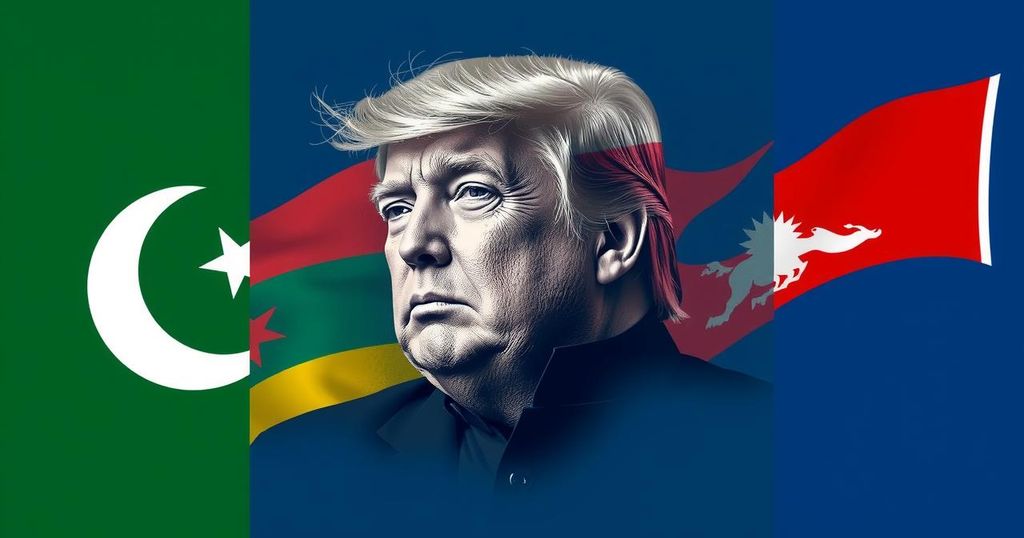Donald Trump returned to the presidency on November 5, 2024, raising concerns and cautious optimism among South Asian countries regarding U.S. foreign policy. Editorials from Pakistan, Bangladesh, Nepal, and Sri Lanka highlight fears over trade relations, climate policies, and the potential for authoritarianism while expressing hope for future engagement with the Trump administration.
On November 5, 2024, Donald J. Trump made a significant return to the presidency of the United States, marking a historic moment as he became the 47th president after an earlier defeat by Joe Biden in 2020. While discussions within America have primarily revolved around the implications for the Middle East and the ongoing Russia-Ukraine conflict, little attention has been given to the potential impact of Trump’s second term on the South Asian subcontinent. In analyzing reactions from Pakistan, Bangladesh, Nepal, and Sri Lanka, there appears to be a mix of apprehension and cautious optimism regarding his administration’s policies toward the region. In Pakistan, the editorial by Dawn highlights that Trump’s victory is attributed to domestic issues, such as high inflation and discontent with Democratic leadership. The editorial casts doubt on prospects for improved U.S.-Pakistan relations, stating, “the last few American administrations have maintained lukewarm ties with this country, and there is little to suggest an improvement in relations under the new Trump set-up.” Bangladesh’s Daily Star expresses a blend of concern and hope, noting Trump’s electoral success and its implications for trade, climate change, and diplomatic relations. The editorial mentions unease surrounding Trump’s characterization of violence against minorities in Bangladesh, raising fears about a U.S. perspective shaped by Indian interests. However, it also conveys optimism as Chief Adviser Prof Muhammad Yunus congratulated the president-elect, suggesting potential for strengthened bilateral ties. In Nepal, The Kathmandu Post offers a critical view of the American electorate, noting the tendency of voters to prioritize emotional connections over rational considerations in their choices. It warns against the allure of strongman leaders and reflects on the challenges facing Nepal’s fragile institutions, warning, “If the US, with its strong history of check and balance, is struggling to manage a single man’s challenge to democracy, a country like Nepal with its weak institutions will be a lot more vulnerable to despotism.” Finally, in Sri Lanka, The Island editorial draws parallels between Trump and local political figures, suggesting that both have faced controversy yet remain in positions of power. The editorial speculates on the broader implications of Trump’s second term, particularly regarding foreign policy issues like the Gaza conflict and U.S. relations with NATO, concluding with cautious optimism by stating, “one may not know, but his presidency surely won’t be worse than Biden’s. One can only keep one’s fingers crossed.”
The article addresses the return of Donald J. Trump to the presidency of the United States and explores the reactions from various South Asian countries regarding potential shifts in U.S. foreign policy. The context of the article situates Trump’s second term within the post-election landscape, examining how it might influence diplomatic relations, trade negotiations, and regional stability in Pakistan, Bangladesh, Nepal, and Sri Lanka.
The reactions from the South Asian press reveal widespread anxiety about the implications of Trump’s presidency on regional dynamics, yet they also express cautious optimism. Concerns over U.S. policy regarding trade, climate change, and diplomatic relations dominate the discourse, along with fears of increasing authoritarianism influenced by strongman politics. As leaders in these nations explore the contours of their future engagements with the U.S., a cautious approach seems warranted to safeguard their national interests amidst uncertain geopolitical developments.
Original Source: indianexpress.com






